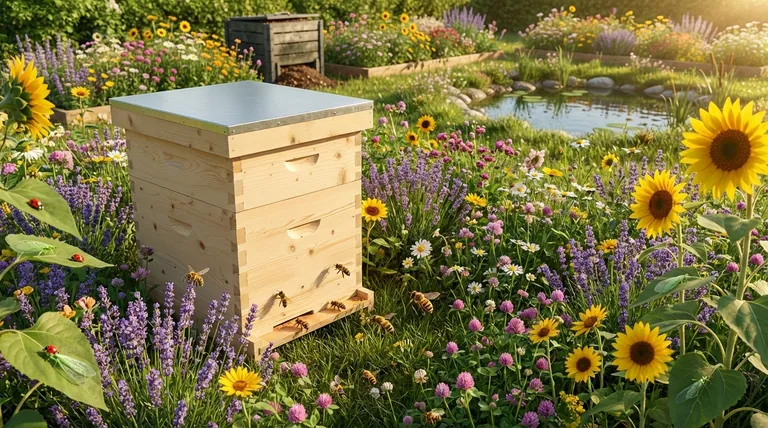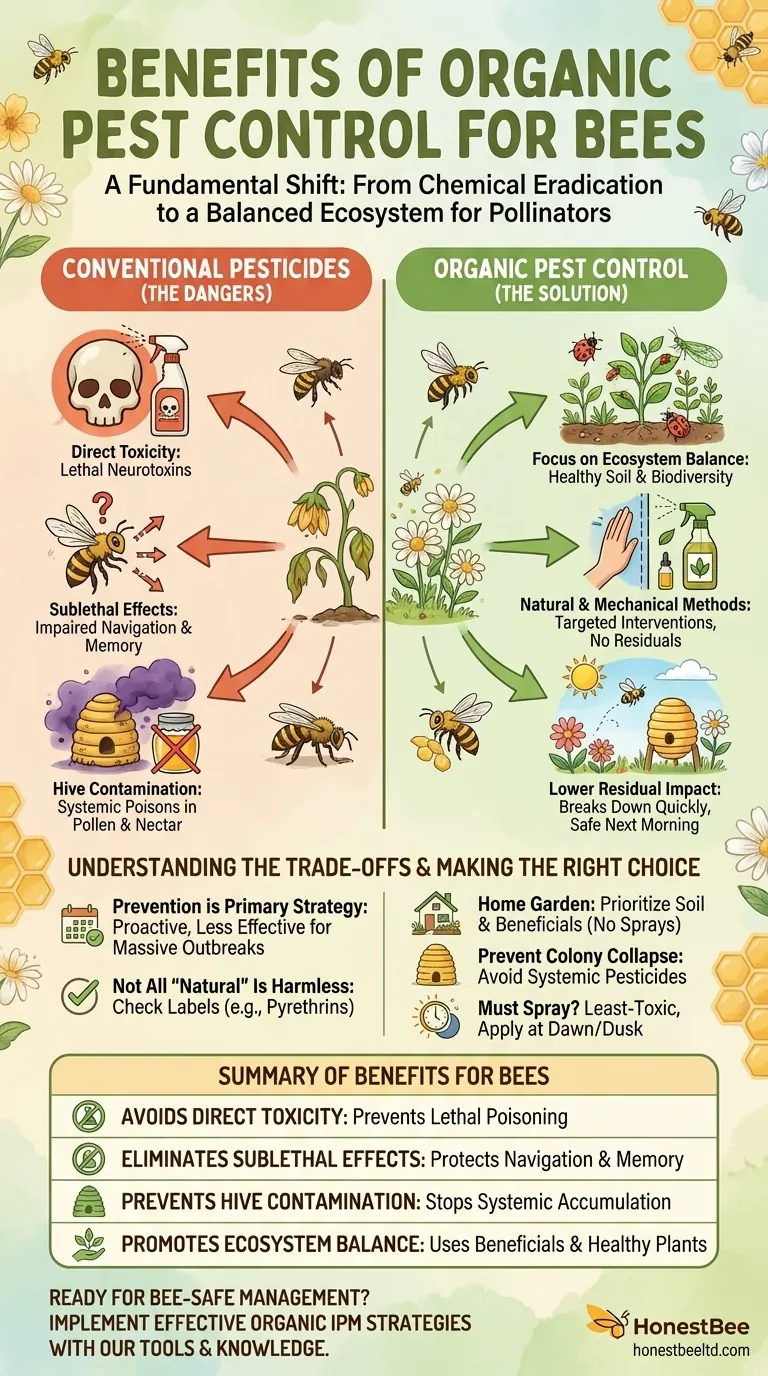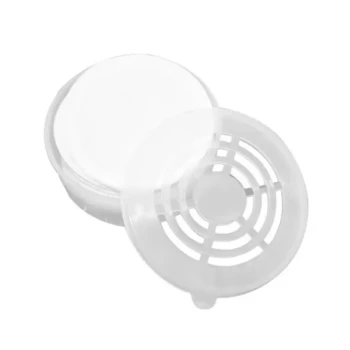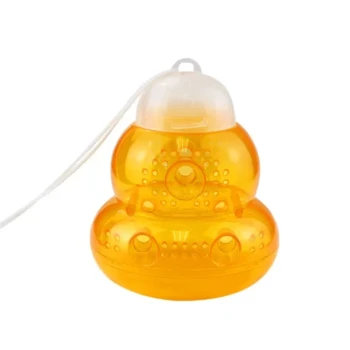The primary benefit of organic pest control is its fundamental compatibility with bee health. By avoiding synthetic, broad-spectrum pesticides, organic methods protect bees from lethal poisoning, debilitating sublethal effects that impair their ability to function, and the long-term contamination of their hive and food sources.
The core advantage isn't just swapping one spray for another; it's a shift in strategy from chemical eradication to creating a balanced ecosystem where pollinators are not treated as collateral damage.

The Dangers of Conventional Pesticides to Bees
To understand the benefits of an organic approach, we must first recognize the specific threats posed by conventional chemical pesticides, particularly a class known as neonicotinoids.
Direct Toxicity and Lethal Effects
Conventional insecticides are often designed to be powerful neurotoxins. They work by attacking the central nervous system of insects.
Because bees are insects, these chemicals are indiscriminate. Direct contact with spray or treated plants can result in rapid paralysis and death.
Sublethal Effects: Navigation and Foraging
Even exposure that doesn't kill a bee outright can be devastating. This is perhaps the most insidious danger.
Low doses of chemical pesticides can impair a bee's memory, learning ability, and navigation skills. A bee that cannot find its way back to the hive is as good as dead and can no longer contribute to the colony.
Systemic Contamination of the Hive
Many modern pesticides are systemic, meaning the plant absorbs the chemical through its roots and distributes it to all its tissues—including the pollen and nectar.
Foraging bees bring these contaminated resources back to the hive. Over time, these toxins accumulate in the honey and wax, poisoning the entire colony, weakening its collective immune system, and harming developing larvae.
How Organic Pest Control Creates a Safer Environment
Organic pest management operates on a different philosophy. Instead of relying on powerful, persistent chemicals, it uses a multi-layered strategy known as Integrated Pest Management (IPM).
Focus on Ecosystem Balance
The first line of defense in an organic system is creating a healthy, resilient environment.
This involves enriching the soil, choosing appropriate plant varieties, and fostering biodiversity. A healthy plant is naturally more resistant to pests, and a diverse garden attracts beneficial insects that prey on pests, providing natural control.
Use of Natural and Mechanical Methods
Instead of broad-spectrum poisons, organic methods favor targeted, less-harmful interventions.
This includes physical barriers like row covers, manual removal of pests, and the use of natural deterrents like horticultural oils or insecticidal soaps. These methods have little to no residual effect and do not contaminate pollen or nectar.
Lower Residual Impact
Most organic-approved pest treatments break down quickly in sunlight and air.
This means they do not linger in the environment for days or weeks. When applied correctly (typically at dusk when bees are not foraging), the risk of direct contact is minimized, and the plant is safe for pollinators the next morning.
Understanding the Trade-offs
Adopting organic methods requires a shift in expectation and effort. It is not a simple one-to-one replacement for chemical sprays.
Prevention is the Primary Strategy
Organic pest control is proactive, not reactive. It succeeds by preventing pest outbreaks from happening in the first place through careful planning and observation.
It can be less effective at wiping out a sudden, massive infestation compared to a powerful chemical agent.
Not All "Natural" Is Harmless
It's a critical mistake to assume every product labeled "organic" is completely safe for bees.
Some organic-approved pesticides, like pyrethrins, can still be toxic to bees upon direct contact. The key difference is their lack of persistence and systemic action, but responsible application is still essential.
Making the Right Choice for Bee Safety
Your approach should be tailored to your specific goals and environment.
- If your primary focus is a home garden: Prioritize building healthy soil and introducing beneficial insects like ladybugs and lacewings, as this will solve most pest issues without any sprays.
- If your primary focus is preventing colony collapse: Advocate for and practice methods that avoid systemic pesticides, as these are the primary drivers of long-term hive contamination.
- If you must spray for a pest issue: Choose the least-toxic option available, read the label carefully, and always apply it at dawn or dusk when bees are not actively foraging.
Ultimately, protecting bees is about choosing methods that work with nature's systems, not against them.
Summary Table:
| Benefit | How It Helps Bees |
|---|---|
| Avoids Direct Toxicity | Prevents lethal poisoning from synthetic neurotoxins. |
| Eliminates Sublethal Effects | Protects bee navigation, memory, and foraging abilities. |
| Prevents Hive Contamination | Stops systemic pesticides from accumulating in wax and honey. |
| Promotes Ecosystem Balance | Uses beneficial insects and healthy plants for natural control. |
Ready to switch to bee-safe pest management?
At HONESTBEE, we supply commercial apiaries and beekeeping equipment distributors with the tools and knowledge to implement effective, organic Integrated Pest Management (IPM) strategies. Protect your investment and the health of your pollinators with our wholesale-focused solutions.
Contact our experts today to discuss how our supplies can support your sustainable beekeeping operation.
Visual Guide

Related Products
- Wholesales Dadant Size Wooden Bee Hives for Beekeeping
- Professional Multi-Function Stainless Steel Hive Tool
- Honey Flow Garden Bee Hive Flow Hive Best Beehive for Beginners
- Compact Circular Bee Mite Treatment Dispenser
- Long Langstroth Style Horizontal Top Bar Hive for Wholesale
People Also Ask
- Why are specialized disease monitoring tools and protective consumables essential? Secure Your Apiary's Future
- What role do hive structural designs and protective consumables play in defending against pests like wax moths?
- How do professional disease diagnostic kits support Caucasian honeybees? Protect Your Apiary with Precise Monitoring
- What challenges do artificial colony splitting processes face in pathogen control? Ensure Biosecurity in Your Apiary
- What is the primary role of beehive anti-hornet nets? Protect Your Apiary from Asian Hornet Predation
- Why is a 4.2mm diameter mesh aperture considered optimal for beekeeping protection cages? Balance Security & Efficiency
- What is the role of suction-based samplers in the manual removal of Small Hive Beetles? Precision Pest Management Tools
- What is the primary technical function of sodium hydroxide solution in beehive disinfection? Master Apiary Hygiene



















